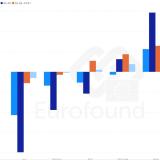
Zatrudnienie i rynki pracy
Zatrudnienie i rynki pracy stanowią jeden z sześciu głównych obszarów działań określonych w programie prac Eurofound na lata 2021–2024. Eurofound będzie kontynuować swoją działalność jako centrum wiedzy specjalistycznej w zakresie monitorowania i analizowania sytuacji na rynkach pracy, w szczególności w odniesieniu do poważnych wyzwań, z jakimi będą się musiały zmierzyć te rynki w wyniku pandemii COVID-19. Gromadzone dane i badania będą dotyczyły głównie konsekwencji pandemii dla warunków pracy i zatrudnienia oraz sposobów na zapewnienie funkcjonowania i inkluzywności rynku pracy.
W latach 2021–2024 badania Eurofound dostarczą istotnej wiedzy na temat wyzwań i perspektyw w obszarze zatrudnienia i rynków pracy UE. Eurofound ma ważną rolę do odegrania w zakresie monitorowania tendencji na rynku pracy oraz monitorowania wpływu tych tendencji na sytuację różnych grup pracowników.
W ogólnym ujęciu badania będą ukierunkowane na zmieniającą się strukturę rynku pracy oraz prowadzone z wykorzystaniem sprawdzonych instrumentów monitorowania Eurofound, Europejskiego Obserwatorium Zatrudnienia (ang. European Jobs Monitor, EJM) i Europejskiego Obserwatorium Restrukturyzacji (ang. European Restructuring Monitor, ERM), jak również w oparciu o dane Eurostatu. W sytuacji wysokiego poziomu bezrobocia, prognozowanego w niektórych krajach, regionach, sektorach i zawodach, które uderzy również w pracowników z najbardziej niepewnym zatrudnieniem i najbardziej narażonych na zagrożenia, instrumenty te pomogą zidentyfikować sektory, zawody i kwalifikacje w fazie wzrostowej lub malejącej. Europejskie Obserwatorium Restrukturyzacji będzie również kontynuować badanie przypadków restrukturyzacji na szeroką skalę, instrumentów prawnych oraz instrumentów wsparcia, jak również środków tworzonych przez partnerów społecznych i władze publiczne w celu wsparcia pracowników zmieniających pracę lub sektor zatrudnienia.
Eurofound skoncentruje się również na problemie niedoboru pracowników oraz niewykorzystanych zasobów ludzkich i zdolności w niektórych sektorach i zawodach, który pogłębił się podczas pandemii COVID-19, poprzez analizowanie interwencji w ramach polityki i praktyk stosowanych przez przedsiębiorstwa. Do poszczególnych zagadnień zaliczać się będą: niedopasowanie umiejętności , czas pracy , mobilność zawodowa i geograficzna, integracja migrantów oraz zatrudnienie grup niedostatecznie reprezentowanych na rynku pracy, takich jakosoby młode, kobiety i osoby z niepełnosprawnościami . Eurofound ukierunkuje swoje działania również na sektory charakteryzujące się niedoborem pracowników, który staje się coraz bardziej naglącym problemem z powodu pandemii. Wyniki powyższych działań posłużą na etapie prac przygotowawczych nad kolejną edycją europejskiego badania przedsiębiorstw .
Eurofound będzie również kontynuować współpracę w tym obszarze ze Wspólnym Centrum Badawczym (JRC) Komisji Europejskiej. Badania nad restrukturyzacją zostaną wykorzystane na potrzeby działalności Europejskiego Funduszu Dostosowania do Globalizacji (EFG) i Europejskiego Funduszu Społecznego Plus (ESF+). Powiązania z siostrzaną agencją Cedefop i Europejskim Urzędem ds. Pracy Zostaną wykorzystane w odniesieniu do umiejętności i mobilności zawodowej w kontekście polityk zatrudnienia ukierunkowanych na zmniejszenie niedoboru pracowników.
- Infografika: Zatrudnienie i rynki pracy w UE
„Nadal sześć na dziesięć osób jest zatrudnionych na umowę na czas nieokreślony. Mimo że posiadane przez nas dane dotyczące „niestandardowego zatrudnienia”, tj. na niepełny etat lub na czas określony, tak naprawdę nie zmieniły się przez ostatnie 5-10 lat, to sygnalizują one trend w kierunku bardziej niepewnych form zatrudnienia. Należy przy tym zaznaczyć, że osoby zatrudnione na umowach niegwarantujących pewności zatrudnienia nie mają takiego samego dostępu do ochrony socjalnej i pracowniczej”.
Tina Weber, kierownik ds. badań, Dział Zatrudnienia
































